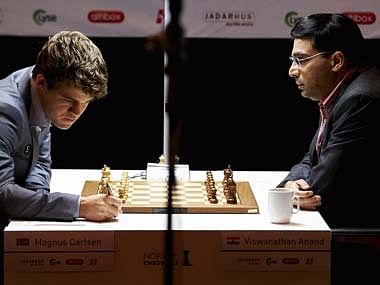
World Chess Championship: Psychology will play a big part in Carlsen-Anand rematch

Bad loss last year
The memories of last year Championship must still be alive for both players -- and for diametrically opposite reasons.
Magnus Carlsen baked under the triumphant glory after he destructively ran through the mind of the then incumbent Champion, Vishwanathan Anand. With a score of 6.5-3.5, and conceding no loss, the Norwegian assured that he take home the title for the first time by humbling Anand at his own backyard, Chennai, in just 10 matches out of 12.
For Anand, it was a Championship match which he never wants to revisit. Back at home, and coming into the match as a four-time consecutive champion, Anand failed to dominate, much less win against, the 22-year-old. To add to the miseries, Sachin’s retirement came on the occasion of his loss, which did nothing but give the critics and the media the infamous question to ask – don’t you think it’s time to retire?
The retirement question
While speculation of Anand’s retirement did the rounds in the Chess world, Anand was building up his own comeback without drumming about it. After spending time with his family and realizing that there is a world beyond chess, Anand stopped going back to the memories of the Championship in about a week. But the nature of defeat he suffered gave him a new vision and motive: he was no longer a Champion and that was enough to spark fire in him.
It’s a different thing to be a Champion and to be a Challenger. When there is a contest between two incredibly talented champions, who are at the top of their games, the dual gets an extra dimension to it besides tactics and game play. And that additional dimension is thirst.
Eagerness to win
Magnus Carlsen, after winning everything that was for the taking in the early phase of this year, seems to be running on the jagged road thereafter. It isn’t just the shock defeats that he faced, but also his attitude on 8x8 boards. His recent matches reflected a passive mood. It almost felt like he didn’t want to be in the room playing with white and black pieces. And that was apparently visible in his defensive strategies and far from threatening moves.
Now, coming into the rematch within a period of year, the questions over Magnus’ motivation are flaring. The additional dimension of thirst, which is so crucial in such encounters, seems to be missing. But the issue of thirst is not concerning Anand. His thirst, on the other hand, is finding new heights. He made his intentions clear by winning the Candidates’, which gave him the right to challenge Carlsen. To fight for something instead of defending it brought back the Anand of earlier years. There is a goal for him, something to achieve; the thirst for victory is easily noticeable.
It is not all about strategies
Should the thirst alone decide the fate of the rematch? No. The strategies, the game plan, will invariably remain vital in chess. That is where Carlsen has the edge over Anand. But should the strategies alone decide the winner? Again, no. As Anand noted in an interview, the emotions guide your tactics in Chess. The better you feel, the better you think. Also, Anand has nothing to lose whereas Carlsen has everything at stake, which gives the Indian luxury to feel free of expectations and burden vis-à-vis his Norwegian counterpart.
So, even if Carlsen goes into the rematch as favourite, the chance of Chennai 2.0 is a fanciful thought. The dynamics have changed and the psychology of both players has changed. And so, the Sochi rematch, as against the lopsided Chennai match, promises to be a more balanced and dogged fight for the coveted title.